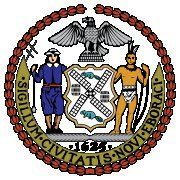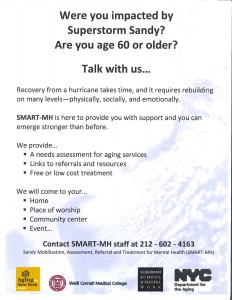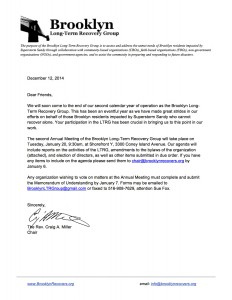Community-Based Disaster Case Management Agencies Help Sandy Impacted Residents Navigate Complex Recovery Programs
With the second anniversary of Sandy approaching, it is important for struggling families to know: you are not alone and you have people who can help.
Disaster Case Managers based at local organizations have been helping impacted residents to navigate the complex and changing recovery programs that exist in New York City in the aftermath of Superstorm Sandy. Each Disaster Case Manager works with up to 34 families as one point of coordinated contact to help them access legal and housing counseling, government programs like Build it Back, and charitable recovery services, some of which are only accessible through Disaster Case Management, like the unmet needs funds or repair assistance through volunteer rebuild groups.
For example, a single mother of one who lived in a basement apartment flooded by Hurricane Sandy, lost almost all of her personal property and was unable to return. A Disaster Case Manager worked with her to secure long-term, affordable, and permanent housing through NYCHA, assisted the client with budgeting, and helped the client search for and secure stable long-term employment. The DCM also applied to the Unmet Needs Roundtable for assistance and was able to help the client receive some replacement furniture and small appliances for the apartment. “Words alone cannot express how this agency has helped myself and my family. You would have to read my utterly grateful heart. Thank you so very much for all of your support,” said the impacted client.
“After local public forums hosted by the Build it Back program, Comptroller Scott Stringer, and others we approach those residents who speak about having difficulties with many of the recovery programs and ask: ‘Do you have a Disaster Case Manager?’ Many didn’t and still don’t realize that this kind of help and support is available to them at no cost,” says Sue Fox, Executive Director of the Shorefront YM-YWHA in Brighton Beach, which has a team of Disaster Case Managers working with local residents.
As of September, Disaster Case Management organizations across the city have 3,531 active cases and have closed over 2,000 by helping families get on the road to recovery. Through the Unmet Needs Roundtable, Disaster Case Managers have been able to access almost $2 million in funding for 708 impacted residents in Brooklyn, and help eight families get their homes repaired through volunteer rebuild groups, with many more in the queue.
Disaster Case Management (DCM) is supported as part of federal disaster assistance following emergencies and helps residents understand and utilize many services and programs that help get people back on their feet. Many community-based organizations in Brooklyn are involved in Disaster Case Management through the New York State program with Catholic Charities or through a variety of donor funded programs. These agencies have the capacity to work with families with many different backgrounds and languages.
“A good Disaster Case Manager is the magic bullet. DCM is how someone affected by Sandy is best connected to the assistance available,” said Richard Vernon, Brooklyn Disaster Recovery Specialist for NYAC/UMCOR. “ A good DCM navigates their client’s household through all the deadlines, financial information, eligibility retirement, language barriers, and so on, to make sure that household reaches the road to recovery.”
Through the DCM committee of the Brooklyn Long Term Recovery Group, DCM agencies are coordinating across agencies, sharing best practices, distributing information about new programs, and plugging into recovery resources for the impacted families we work with. Case managers prepare and present high needs cases to the Construction, Volunteers, and Donations committee, which brings together organizations doing volunteer rebuild and repair work, as well as to the Unmet Needs Roundtable, convened by New York Disaster Interfaith Services, which provides resources to help families become whole and sustainable. Some of these groups involved in the committee include Arab-American Family Support Center, Catholic Charities Brooklyn & Queens (CCBQ), CAMBA, Lutheran Social Services, Met Council, Catholic Charities-Archdiocese of New York, Red Hook Volunteers, and NYAC-UMCOR.
Impacted families who do not have a case manager should call the referral line at 855-258-0483 to be connected to a case manager.
More information about Brooklyn recovery and the Brooklyn Long Term Recovery Group can be found online at brooklynrecovers.org , on twitter at @BrooklynLTRGrp, or on Facebook at facebook.com/BrooklynLongTermRecoveryGroup
The Brooklyn Long-Term Recovery Group (LTRG) is helping build community-based recovery as a forum for communication, collaboration, and advocacy for community-based organizations, service providers, and disaster relief groups serving Hurricane Sandy impacted families in Brooklyn’s coastal communities.



